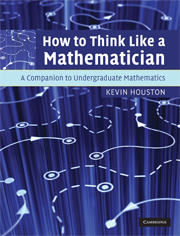Book contents
- Frontmatter
- Contents
- Preface
- I Study skills for mathematicians
- 1 Sets and functions
- 2 Reading mathematics
- 3 Writing mathematics I
- 4 Writing mathematics II
- 5 How to solve problems
- II How to think logically
- III Definitions, theorems and proofs
- IV Techniques of proof
- V Mathematics that all good mathematicians need
- VI Closing remarks
- Appendices
- Index
4 - Writing mathematics II
from I - Study skills for mathematicians
- Frontmatter
- Contents
- Preface
- I Study skills for mathematicians
- 1 Sets and functions
- 2 Reading mathematics
- 3 Writing mathematics I
- 4 Writing mathematics II
- 5 How to solve problems
- II How to think logically
- III Definitions, theorems and proofs
- IV Techniques of proof
- V Mathematics that all good mathematicians need
- VI Closing remarks
- Appendices
- Index
Summary
Learn as much by writing as by reading.
Lord Acton, Lectures on Modern History, 1906In the previous chapter we were concerned with the basic principles of writing mathematics. Here we shall become more specific and give particular examples of ways to improve the presentation of mathematics.
Expressing yourself clearly
If you use ‘if’, then use ‘then’
If you use the word ‘if’, then use the word ‘then’ as well. (It is traditional to punctuate with a comma before the word ‘then’ but this seems to be dying out.) That is,
‘If x is odd, then x2 is odd’
is preferable to
‘If x is odd, x2 is odd.’
Statements can be written to include ‘if’ but for which ‘then’ is not needed:
‘x2 is odd if x is odd.’
But, in general, use ‘then’ as confusion may result when it is not employed. For example, what is the meaning of
‘If a > 0, b > 0, a + b > 0’?
It could mean
‘if a > 0, then b > 0 and a + b > 0.’
This is because maybe a is positive and so forces b to be positive, for example, b = 5a.
Alternatively, it could mean
‘If a > 0 and b > 0, then a + b > 0’
which is always true. The point is that omission of ‘then’ can lead to ambiguity. In many cases the reader can deduce the meaning of a statement with the ‘then’ omitted, but it is safer to include it.
- Type
- Chapter
- Information
- How to Think Like a MathematicianA Companion to Undergraduate Mathematics, pp. 35 - 40Publisher: Cambridge University PressPrint publication year: 2009



